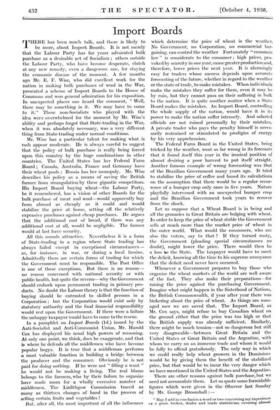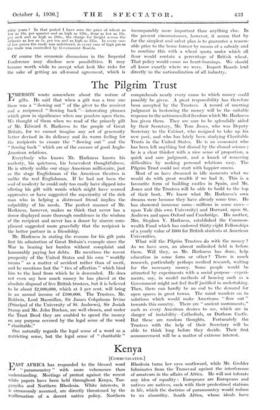Import Boards
THERE has been much talk, and there is likely to be more, about Import Boards. It is not merely that the Labour Party has for years advocated bulk purchase as a desirable act of Socialism ; others outside the Labour Party, who have become desperate, clutch at any new remedy, even a dangerous one, for staying the economic disease of the moment. A few months ago Mr. E. F. Wise, who did excellent work for the nation in making bulk purchases of wool in the War, presented a scheme of Import Boards to the House of Commons and won general admiration for his exposition. In unexpected places one beard the comment, "Well, there may be something in it. We may have to come to it." Those non-Socialists who played with the idea were overwhelmed for the moment by Mr. Wise's ability and perhaps forgot that State-trading in the War, when it was absolutely necessary, was a very different thing from State-trading under normal conditions.
Mr. Wise has a particular talent for making what is rash appear moderate. He is always careful to suggest that the policy of bulk purchase is really being forced upon this country by the huge combinations in other countries. The United States has her Federal Farm Board ; Canada, Australia, France and Germany have their wheat pools ; Russia has her monopoly. Mr. Wise describes Isis policy as a means of saving the British farmer from strangulation by these gigantic competitors. His Import Board buying wheat—the Labour Party, be it remembered, has a vision of other Boards for the bulk purchase of meat and wool—would apparently buy from abroad as cheaply as it could and would stabilize the price at home, setting off the relatively expensive purchases against cheap purchases. He argues that the additional cost of bread, if there was any additional cost at all, would be negligible. The farmer would at last have security.
All this sounds attractive. Nevertheless it is a form of State-trading in a region where State trading has always failed except in exceptional circumstances— as, for instance, in war, or during a local famine. Admittedly there are certain forms of trading for which the Government must be responsible. The Post Office is one of these exceptions. But there is no reason— no reason concerned with national security or with public health, but quite the reverse—why the Government should embark upon permanent trading in primary pro- ducts. No doubt the Labour theory is that the function of buying should be entrusted to skilled persons in a Corporation ; but the Corporation would exist only by statutory authority and the final financial responsibility would rest upon the Government. If there were a failure the unhappy taxpayer would have to come to the rescue.
In a pamphlet on Import Boards (id.) issued by the Anti-Socialist and Anti-Communist Union, Mr. Harold' Cox has displayed his usual high powers of reasoning. At only one point, we think, does he exaggerate, and that is where he defends all the middlemen who have become popular bogys. It is true that a middleman performs a most valuable function in building a bridge between. the producer and the consumer. Obviously he is not paid for doing nothing. If he were not "filling a want" he would not be making a living. The real blame belongs to the farmers, who by their failure to organize have made room for a wholly excessive number of middlemen. The Linlithgow Commission traced as many as thirteen changes of hand in the process of
selling certain fruits and vegetables ! • But, after all, the most important of all the-influences which determine the price of wheat is the weather. No Government, no Corporation, no commercial bar- gaining, can control the weather Fortunately "economic law" is considerate to the consumer; high prices, pro- voked by scarcity in one year, cause greater production and, therefore, lower prices the next year. It is alarmingly easy for traders whose success depends upon accurate forecasting of the future, whether in regard to the weather or the state of trade, to make mistakes. When individuals make the mistakes they suffer for them, even it may be by ruin, but they cannot pass on their suffering in bulk to the nation. It is quite another matter when a State Board makes the mistakes. An Import Board, controlling the whole supply of the nation, would have it in' its power to make the nation suffer intensely. And salaried officials are not ruined personally by their mistakes. A private trader who pays the penalty himself is neces- sarily restrained or stimulated to prodigies of energy by his very apprehension.
The Federal Farm Board in the United States, being tricked by the weather, went so far wrong in its forecasts that it found itself this year in the ironical position of almost desiring a poor harvest to put itself straight. Another famous example of wrong forecasting was that of the Brazilian Government many years ago. It tried to stabilize the price of coffee and based its calculations on the assumption that there would be a regular recur- rence of a bumper crop only once in five years. Nature playfully intervened with an unexpected bumper crop and the Brazilian Government took years to recover from the shock.
Let us suppose that a Wheat Board is in being and all the granaries in Great Britain are bulging with wheat.
In order to keep the price of wheat stable the Government sells at much more than the market price of wheat in the outer world. What would the consumers, who are also the voters, say to that ? If they turned rusty, the Government (pleading special circumstances no doubt), might lower the price. There would then be a loss to the State. The taxpayer would have to meet the deficit, knowing all the time to his supreme annoyance that the deficit need never have occurred.
Whenever a Government prepares to buy those who organize the wheat markets of the world are well aware of the fact. They also make their preparations—for raising the price against the purchasing Government. Imagine what might happen in the Sisterhood of Nations, the British Commonwealth, if year after year there was bickering about the price of wheat. As things are man- aged now we are saved that. The Import Board, as Mr. Cox says, might refuse to buy Canadian wheat on the ground either that the price was too high or that the British supply was already sufficient. Similarly, there might be much tension—not so dangerous but still very disagreeable—between Great Britain and the United States or Great Britain and the Argentine, with whom we carry on an immense trade and whom it would be folly to offend gratuitously. The only way in which we could really help wheat growers in the Dominions would be by giving them the benefit of the stabilized price, but that would be to incur the very danger which we have mentioned in the United States and the Argentine.
There are other reasons against bulk purchase, but we need not accumulate them. Let us quote someformidable figures which were given in the Observe?. last Sunday by Mr. George Broomhall :— "May I add in conclusion a word or two concerning my experience rs a grain broker, dealer and trade statistician covering -abnost
sixty years ? In that period I have seen the price of wheat as low as 13s. per quarter and as high as 120s., Hour as low as 15s. per sack and as high as 100s., the charge for freight across the Atlantic as low as 55. per ton and as high as 235s. In every case of low prices the trade was unfettered, in every case of high prices the trade was controlled by Government Boards.
Of course the economic discussions in the Imperial Conference may disclose new possibilities. It may become worth while to accept what look like risks for the sake of getting an all-round agreement, which is
incomparably more important than anything else. In the present 'circumstances, however, it seems that by far the simplest and safest plan is to guarantee a reason- able price to the home farmer by means of a subsidy and to combine this with a wheat quota under which all flour would contain a percentage of British wheat. That policy would cause no heart-burnings. We should all know exactly where we were. Import Boards lead directly to the nationalization of all industry.





















































 Previous page
Previous page